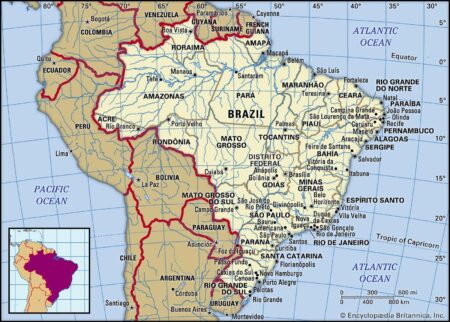The Net-Zero Circle unveiled a new Investor Guide focused on Brazil’s critical minerals sector at a high-profile UK-Brazil event. This initiative aims to attract investment in sustainable mining, aligning with global net-zero goals amid rising demand for green technologies.
Browsing: environmental policy
Brazil is set to initiate preliminary discussions in preparation for the COP30 climate summit, aiming to align strategies for combating climate change. These talks will lay the groundwork for the countryﻗs commitments as host of the pivotal event.
Canada’s Minister is advocating for a doubling of LNG Canadaﻗs capacity to meet growing demand and strengthen energy exports. The proposal includes an upgrade to western pipelines, highlighting the government’s focus on expanding the nationﻗs LNG potential.
Brazil has appointed an auto industry executive as the climate champion for COP30, aiming to drive sustainability in the automotive sector. This initiative reflects the country’s commitment to innovative solutions in addressing climate change.
The UK government has unveiled strict sales targets for heat pumps, aiming to boost clean energy adoption. Enforced by penalties for non-compliance, the initiative seeks to accelerate the transition to sustainable heating solutions across the nation.
The International Atomic Energy Agency (IAEA) has reaffirmed that Japan’s release of ALPS-treated water from the Fukushima facility continues to meet international safety standards. This report highlights ongoing monitoring efforts and the safety of the discharge process.
China’s failure to meet its emissions reduction targets raises concerns for global climate efforts, as the world’s largest emitter struggles to balance economic growth with environmental responsibilities. This setback could hinder international progress on climate agreements.
US lawmakers are being called upon to intervene in China’s activities in the Democratic Republic of Congo, where it is accused of exploiting critical mineral resources. Advocates warn that such practices could have severe geopolitical and environmental implications.
Spain has secured EU approval for a ﻗ؛699 million initiative aimed at bolstering energy storage capacity by 2.5 to 3.5 GW. This scheme is poised to enhance grid stability and support the transition to renewable energy sources in the country.
Germany has announced significant investment plans aimed at bolstering sustainable initiatives, backed by the Green Party. This move underscores the government’s commitment to green technologies and climate action, reflecting a broader environmental strategy.
The UK has reaffirmed its commitment to nuclear safety at the Eighth Review Meeting of the Joint Convention, emphasizing robust spent fuel management and effective radioactive waste strategies. The statement highlights ongoing efforts to enhance safety protocols and international collaboration.
Brazil is finalizing the details of its forest fund in preparation for COP30, aiming to bolster global climate commitments. This fund is expected to play a crucial role in supporting conservation efforts and sustainable development initiatives.
Italy and Spain have voiced support for France’s initiative aimed at revitalizing the EU chemicals industry. This collaborative effort seeks to address competitive challenges, enhance sustainability, and ensure the sector’s resilience in a rapidly evolving market.
In a significant policy shift, German leaders have reached an agreement to increase spending on defense and climate initiatives. This move reflects a commitment to bolster national security and address pressing environmental challenges.
In his upcoming visit to Beijing, Ed Miliband emphasizes the critical role China plays in the global fight against climate change. With its vast industrial footprint and emissions, he advocates for urgent collaboration to drive sustainable solutions worldwide.
The U.S. has paused negotiations with Canada regarding water-sharing agreements for the Columbia River, citing unresolved issues. This decision raises concerns over regional water management and ecological impacts as both countries face climate challenges.
Germany’s new government faces a critical challenge: leading the energy transition while adhering to climate protection commitments. Striking a balance between economic stability and sustainable practices is essential for the nation’s ecological future.
France has initiated a comprehensive plan to adapt to a potential 4ﺡﺍC temperature rise by the century’s end. The strategy focuses on enhancing infrastructure resilience, fostering sustainable practices, and safeguarding biodiversity to mitigate climate impacts.
Concerns over pollution from the cargo ship crash off the UK coast have diminished as authorities assess the situation. The Russian captain remains in detention as investigations continue into the incident, which initially raised alarms about potential environmental damage.
Brazil has issued a stark warning regarding Donald Trumpﻗs tariffs and trade wars, highlighting that the financial strain they impose diverts critical resources away from climate action initiatives. This adds to growing concerns over global environmental efforts.

















